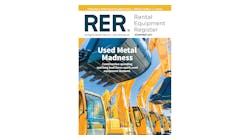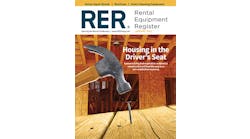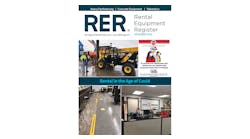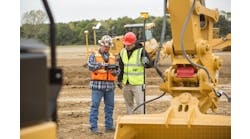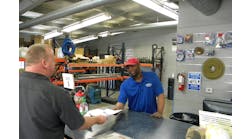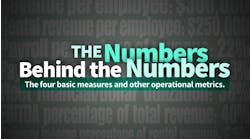It might have worked 10 years ago. Hiring someone with strictly rental or equipment experience as your frontline, customer-facing employee might have been your ideal candidate. Your priority might have been for that person to know how to operate or even service the equipment.
In today's workforce, however, is that enough? Do you need to be looking for more in your ideal candidate? While equipment or rental experience is important, is it enough? Today's employers are looking for candidates who have experience in customer and sales situations. They want a more balanced employee who can do more than talk equipment.
While today's employee may have less equipment experience, they are typically more formally educated. Some equipment rental companies will only hire college graduates. The college degree is often an indicator that this employee is trainable and more likely to look at the position as a starting point in a career. Obtaining that college degree can demonstrate a history of discipline, success and persistence.
This evolution in the background of the employee mirrors the evolution in the equipment rental business. With the consolidation in the past decade, there is a greater presence of large corporations in the industry. These corporations have had a greater impact in the type of employee being hired. They are more comfortable with someone with a college degree or experience. They are looking at an inside sales position as the starting point in that employee's career.
The products being rented today have also evolved. In some cases, they are not as complex or detailed. Operating the equipment has been simplified and employees are not as often required to demonstrate the equipment. In the rental environment, customers are not expecting employees to know everything about the equipment, but they are hoping for a professional who can build a relationship and service their needs.
Our clients at Signature have indicated that their customers are looking for customer service first and equipment knowledge second. We don't want to diminish knowing the equipment and its application, but that is no longer a top priority of rental customers. When they call on the phone or visit a rental location, they generally know what they want. Your employees now fill the role of a partner — making certain they have the equipment to successfully complete their job. It goes back to building a trusting relationship with the customer.
That relationship is key to building your business. Customers are more likely to continue to do business with companies they feel most comfortable with, that consistently exceed their expectations. This repeat business of course leads to more referrals, a stronger reputation and, ultimately, greater revenues.
It is important that you probe for customer service and relationship-building experience during the interview process. Ask behavioral questions during the interview such as, “Tell me about a situation in which a customer was upset. How did you resolve the situation?” or “What are some skills you use to build relationships with your customers?”
Now that you have the right employee in place, your responsibility does not end. In order to make that employee as productive as possible, you need to provide them the necessary training. You need to identify the gap between their skills and your standards, and train to close that gap. Part of that training may include product training, as well as customer service and sales training.
The product training is often the easiest. You have many people in your organization that are experts on the products you rent and sell. They know exactly what the products can and cannot do. Your manufacturers offer a variety of programs to make certain you can communicate effectively regarding their products. There are many brochures and product cards available.
The challenge is often in making certain your employees know what is expected of them regarding customer service and sales skills. Here are some factors to consider in regard to your customer service and sales development strategy.
-
Do you have standards defined? Employees need to know what is expected of them in regard to the service they are expected to deliver. When you go to a full-service restaurant versus a fast-food restaurant you have different expectations — there are different standards.
Be as specific as you can be in regards to your standards. Different standards may exist for phone and in-person interactions. Standards should be defined for personal appearance, as well as the appearance of your facility. Train your employees to uphold these standards.
-
What are your customers expecting in terms of customer service? Your standards should be set so they are exceeding customers' expectations. You want to develop a reputation for great products, employees and service. When customers have high expectations, you can begin charging a premium for your products and services. Customers see great value in the relationship — they want more than someone to just rent them a piece of equipment.
-
Who is setting the example for great service in your organization? What is your culture and is that culture defined throughout your company? It starts at the top and must be communicated throughout the organization. You cannot expect your employees to deliver legendary customer service when your management and leadership team is indifferent.
-
How is customer service being measured? What gets measured gets done. Develop metrics that will guide your customer service strategy. A lot of our clients ask us to mystery-shop their employees or evaluate monitored calls so they can provide an objective measurement tool and provide constructive feedback. In addition to the phone calls, many rental companies will periodically survey their customers on their experiences with the company.
-
How are sales being measured? Every rental company measures the sales productivity of its outside sales staff. There are carefully monitored quotas. However, it is also important to set goals for your inside sales staff. They need to be more than order-takers. Measure them on their sales or ability to up sell. There are significant revenue opportunities with an inside sales staff that is focused on closing business. Of course if this is a requirement of the position (and it should be), you need to train new inside sales employees on these skills.
-
Are you rewarding and recognizing great customer service and sales accomplishments? Along with skills being measured, it is important that employees with exemplary skills are rewarded. An incentive program provides positive recognition and emphasizes the importance of great customer service and sales skills.
The equipment rental industry has evolved and matured over time. It is now a multi-billion dollar industry dominated by many large corporations. With this evolution, employee standards and requirements have changed. Customers are looking for more than product knowledge. You need employees with the skills and tools required to consistently exceed customer needs. Set your standards high.
Barry Himmel is a senior vice president for Signature Worldwide, a Dublin, Ohio-based sales and marketing consulting company offering customer service training, marketing and mystery shopping services for the equipment rental industry. For more information, call (800) 398-0518 or visit www.signatureworldwide.com/pr.
